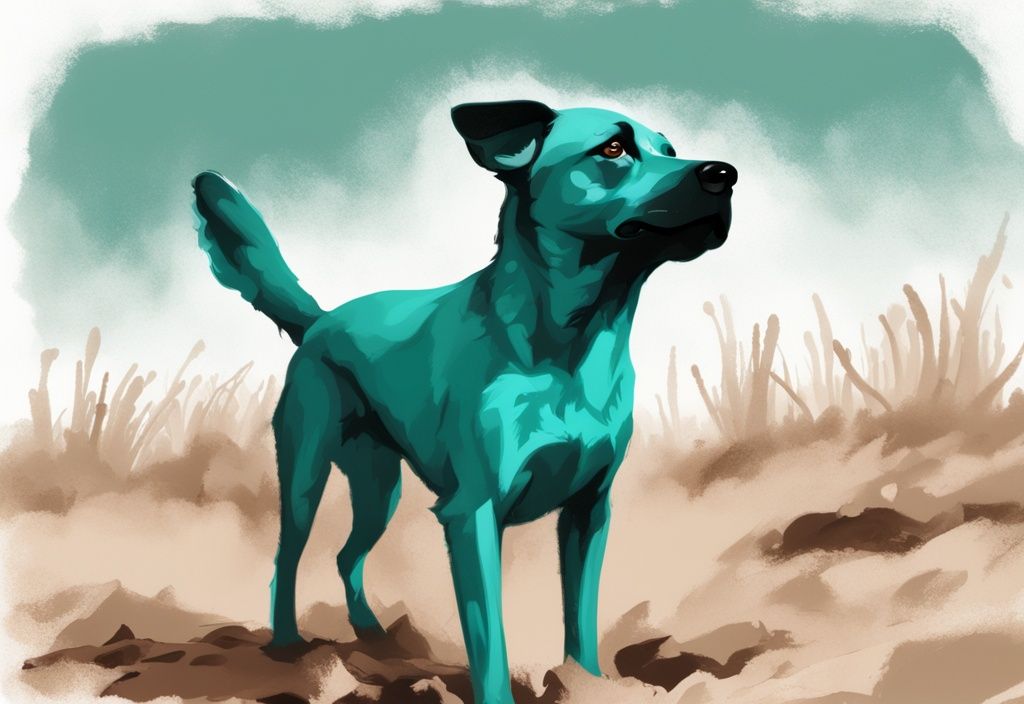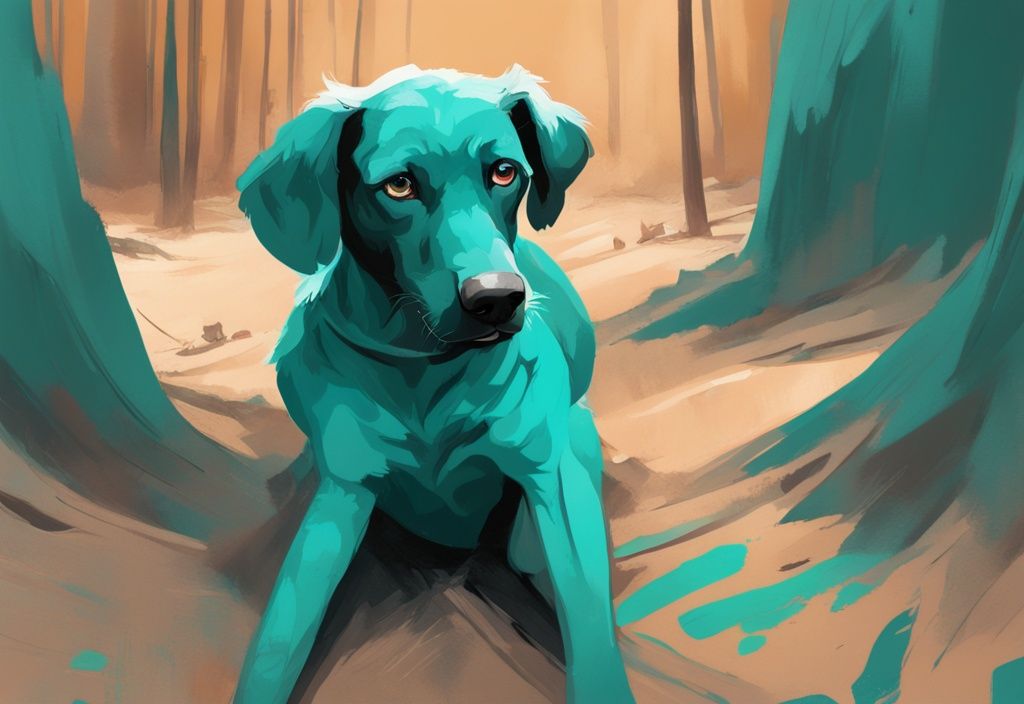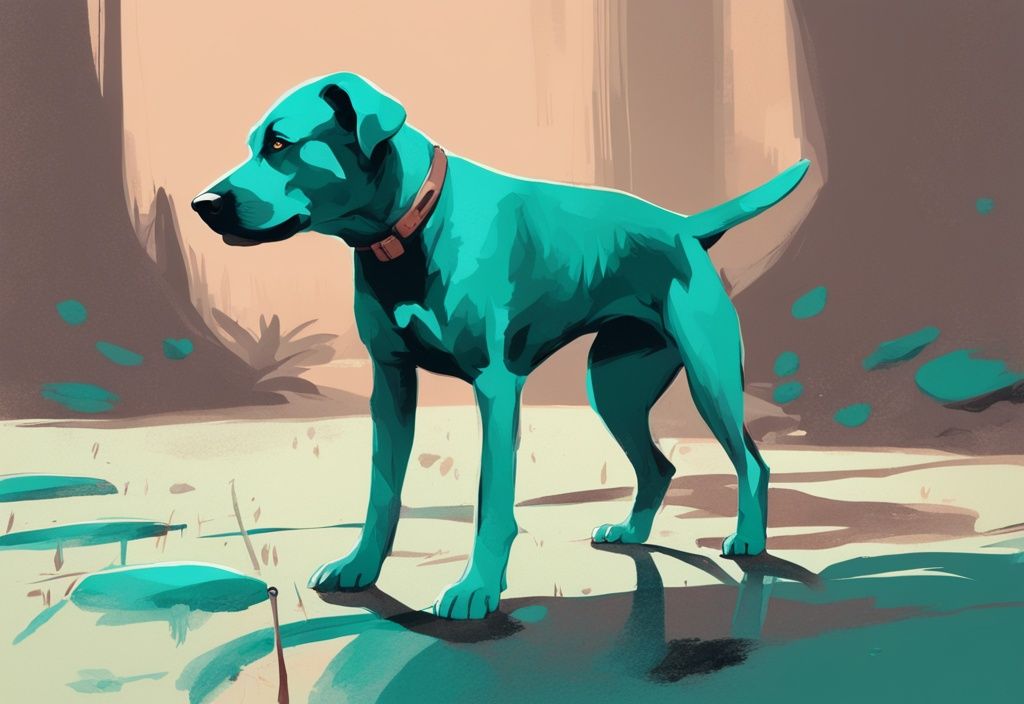Ever looked in disbelief as your playful pup undergoes a bout of dry heaving but then resumes with their usual antics, tail wagging and all? Isn’t it a puzzle – your dog is dry heaving but acting normal.
In the quirky life of our four-legged friends, this is actually quite common. Yet, it could be a whisper from their body telling us that something isn’t quite right. Fear not though, we’re about to dive into all things ‘doggy dry heaving’.
By the end of this article, you’ll be able to decode this all-too-common canine conundrum. We’ll look at potential causes, crucial signs, and proactive solutions, so that you can always stay one paw ahead of your furry friend’s health and happiness. After all, isn’t that what this dog-loving community is all about?
Understanding Dry Heaving in Dogs
When a dog is dry heaving but acting normal, it can certainly be unsettling for any pet parent. Imagine your pup making those retching sounds and motions, attempting to vomit but with nothing coming out. It almost looks like they’re throwing an imaginary ball. This can appear alarming, but the more we understand it, the better care we can provide our furry friends.
Dry heaving is essentially a reflex action. It involves the contraction of the diaphragm and abdominal muscles, sort of like a failed attempt to empty the stomach’s contents. This sets it apart from actual vomiting where something does come out. Occasionally, healthy dogs might experience dry heaving, but if it happens frequently, it might be signaling an underlying issue that needs our attention.
If you notice that your dog is dry heaving but acting normal otherwise, it could be due to minor irritations in the throat or digestive tract. Think of it like a stubborn tickle in your throat that just won’t go away. However, persistent dry heaving suggests there could be more serious issues at play, such as an obstruction in the throat, gastrointestinal problems, or respiratory infections. Monitoring your dog’s overall behavior and additional symptoms is key to figuring out the cause and taking the right steps.
Here’s a little trick: observe any patterns or triggers that coincide with your dog’s dry heaving episodes. Sometimes, excitement or stress can prompt this reflex. Ensuring your dog stays calm and comfortable can minimize these episodes. My Border Collie, Max, for instance, gets so excited when he sees his favorite ball that he sometimes dry heaves. Regular vet check-ups are essential too, as they can help identify and address potential health issues early on, preventing them from becoming bigger concerns.
Consider any recent changes in your dog’s diet, environment, or routine. New food? A different brand of treats? Even seemingly minor changes can sometimes trigger dry heaving. Allergies or irritants could be the culprits as well. Providing fresh water and a quiet space can help soothe your dog until you can consult with a veterinarian for a thorough examination and professional advice.
Remember, staying observant and proactive can make all the difference in your dog’s well-being. And who knows, you might just catch that underlying issue early, saving both you and your furry friend from unnecessary stress. Happy pet parenting!
Why is My Dog Dry Heaving but Acting Normal?
If your dog is dry heaving but acting normal, it might signal an emerging health issue that isn’t fully manifested yet. While their lively demeanor suggests they aren’t in immediate distress, it’s crucial to monitor them closely as dry heaving can be a precursor to more serious conditions.
It’s a bit like a sneak peek into what could become a larger issue — better to catch it early, right?
Several potential causes could be at play:
- Gastroenteritis: Think of this as a tummy tantrum involving inflammation of the stomach and intestines. It can cause discomfort and lead to dry heaving. Your dog might appear their normal bouncy self at first, but the condition can develop and worsen over time, with other symptoms like diarrhea or vomiting crashing the party.
- Pancreatitis: This is an inflammation of the pancreas and can cause dry heaving due to digestive disturbances. Dogs might still act like everything’s cool in the early stages, but pancreatitis can quickly turn serious, leading to pain, lethargy, and loss of appetite.
- Ingestion of Foreign Objects: Sometimes, our curious pups swallow things they shouldn’t, causing gagging and dry heaving. Even if your dog seems fine otherwise, this can quickly escalate to an emergency if the object causes blockage. Max once swallowed a piece of his toy — not fun!
- Poisoning: Toxins or certain chemicals can irritate the gastrointestinal lining or nervous system, triggering dry heaving. It’s vital to consider what your dog might have ingested if they show this symptom. One time, Whiskers accidentally nibbled on a plant and had a rough day!
- Stress/Excitement: High levels of stress or excitement can cause a dog to retch and dry heave, especially if they’ve been running or playing vigorously. While this might not be immediately alarming, consider it a potential sign of underlying anxiety or over-exertion.
Common Causes of Dry Heaving in Dogs
Dry heaving can sometimes be due to specific issues, which could range from minor to more serious conditions. Being aware of these can help you determine when to head to the vet.
- Foreign Object in the Throat: When a dog has a foreign object lodged in its throat, it often results in gagging, retching, and dry heaving. This can be an emergency situation if the object obstructs the airway, necessitating prompt removal by a veterinarian.
- Gastric Dilation-Volvulus (Bloat): Bloat is a critical condition where the dog’s stomach expands with gas and may twist, blocking both the entrance and exit. This requires immediate veterinary attention. Symptoms of bloat include a swollen, tender abdomen, labored breathing, and an increased heart rate.
- Kennel Cough: Kennel cough is a highly contagious respiratory condition marked by a dry, hacking cough, which can lead to dry heaving. It is important to isolate the affected dog and consult a vet, as this condition can spread easily among other dogs.
- Upper Respiratory Infection: These infections can irritate a dog’s throat, leading to dry heaving. Dogs with respiratory infections may show additional symptoms like sneezing, coughing, and nasal discharge, necessitating a vet visit for appropriate treatment.
- Tonsillitis or Pharyngitis: Inflamed tonsils or pharynx can impact a dog’s breathing and trigger gagging that leads to dry heaving. Though your dog may seem normal otherwise, untreated tonsillitis or pharyngitis can worsen, so veterinary advice is essential.
- Tumor in the Throat: Throat tumors can cause significant discomfort, making swallowing and breathing difficult, which results in dry heaving. Such conditions require surgical intervention and a thorough examination by a veterinarian.
By closely observing your dog and noting any accompanying symptoms, you can determine whether a vet visit is necessary. Even if your dog looks normal while dry heaving, it’s always better to err on the side of caution and seek professional advice. After all, our pets trust us to look out for them, just as much as we count on their joyful company every day.

Recognizing Symptoms Accompanying Dry Heaving in Dogs
When a dog is dry heaving but acting normal, it’s crucial to keep a close eye out for other symptoms that might point to a hidden issue. Sure, one instance of dry heaving might not be alarming, but if it happens repeatedly, it’s time to pay attention and maybe even chat with a vet.
First, check for lethargy. An unusually tired or low-energy dog might be dealing with something more serious. Also, if your dog suddenly loses its appetite and turns its nose up at food and treats, that’s a big red flag and could indicate a problem that needs veterinary care.
Another important symptom is a bloated abdomen. This could hint at gastric dilation-volvulus (bloat), a serious condition that needs immediate vet attention. Gently feel your dog’s tummy; if it’s swollen or your dog seems uncomfortable, it’s definitely a cause for concern.
Pay attention to labored breathing. Heavy panting, difficulty breathing, or excessive panting are signs that your dog might be in trouble. To check, you can place your hand on your dog’s chest; if the heartbeat feels too rapid, it might mean your dog is stressed or unwell.
Lastly, always watch for general signs of distress. Whimpering, pacing, or restlessness are signals that your dog might be in pain or uncomfortable. Combined with dry heaving, these symptoms should prompt you to seek veterinary advice to make sure your furry friend stays happy and healthy.
When Should You Be Worried?
Knowing when to be concerned about your pup is crucial, especially if your dog is dry heaving but acting normal. Even minor symptoms can be indicators of serious underlying conditions that need immediate attention.
**Immediate Veterinary Consultation**
If your dog is dry heaving but acting normal, don’t wait to seek veterinary advice. Dry heaving might seem harmless, but it can signal potentially life-threatening issues like gastric dilation-volvulus (bloat), foreign object obstruction, or severe respiratory problems.
**Frequent Dry Heaving Requires Attention**
Repeated dry heaving episodes shouldn’t be dismissed. Frequent or consistent dry heaving might point to chronic issues such as ongoing respiratory infections or lingering gastrointestinal concerns. These conditions need professional diagnosis and treatment to prevent further complications and ensure your dog stays healthy.
**Look for Additional Symptoms**
Be especially cautious if dry heaving comes with other worrisome signs. Keep an eye out for:
- Bloated Abdomen: A swollen belly can be a sign of bloat or other gastrointestinal distress and always demands immediate veterinary attention.
- Labored Breathing: Difficulty in breathing may indicate respiratory infections or obstructions requiring urgent care.
- Lethargy: If your typically energetic dog seems unusually tired or inactive, this might suggest that the underlying issue is affecting their overall well-being.
- Loss of Appetite: Dogs refusing to eat might be in pain or experiencing severe discomfort that needs investigating.
Monitoring these additional symptoms helps form a clearer picture of your dog’s health and guides your conversation with the vet. Early intervention can make a significant difference in treatment outcomes, so be vigilant and proactive in seeking professional help.
Reach Out to a Vet: When and Why
When a dog is dry heaving but acting normal, it may not seem like an immediate cause for concern. However, understanding when to seek veterinary assistance can be crucial for your pet’s well-being.
Frequent Dry Heaving: A Warning Sign
If your dog is experiencing frequent dry heaving, even without other symptoms, it could be indicative of an underlying health issue. Repeated dry heaving episodes may suggest a latent condition that requires medical attention. Consistent dry heaving is not typical behavior and warrants a timely evaluation by a veterinarian.
Accompanying Concerning Signs
Dry heaving accompanied by symptoms such as a bloated abdomen, trouble breathing, or lethargy should be treated as an urgent issue. These signs may indicate serious conditions like gastric dilation-volvulus (bloat) or an obstructed airway, both of which could become life-threatening without prompt intervention.
Understanding Occasional vs. Patterned Dry Heaving
It’s essential to differentiate between a single, isolated episode and a recurring pattern. While an occasional bout of dry heaving might not necessitate a vet visit, a pattern of frequent episodes is a red flag. Prolonged and frequent dry heaving, especially if your dog is acting normal otherwise, should not be ignored as it might signal a developing health problem.
Taking Immediate Action
Immediate veterinary consultation is recommended if your dog is experiencing frequent dry heaving, regardless of whether they seem otherwise unaffected. Timely intervention can help diagnose potential issues early and prevent complications. Even if the dog appears to be acting normal, frequent dry heaving isn’t normal and should be checked to ensure there’s no hidden medical issue.

Providing comprehensive care includes knowing when to escalate concerns about your dog’s health. By staying vigilant and responsive to signs like dry heaving, pet owners can help ensure their dogs receive the professional attention they need to stay healthy and happy.
Solving the Puzzle: Diagnostic Procedures for Dry Heaving in Dogs
If your dog is dry heaving but acting normal, it’s natural to feel a mix of concern and confusion. Let’s dive into what might be going on and how to solve this little mystery through diagnostic procedures.
Firstly, the journey begins with a full physical examination by your trusted vet. Think of this step as an all-encompassing health check-up for your furry friend, ensuring there’s nothing visibly amiss. It’s much like reading the first chapter of a mystery novel, setting the scene and getting all the crucial details in place.
To unravel the mystery of why your dog is dry heaving, veterinarians often recommend a series of diagnostic tests:
- Blood Tests: These are the magnifying glasses of the vet world. They can uncover infections, organ issues, or metabolic disorders that might be behind the dry heaving. Elevated enzymes? Could be pancreatitis. Irregular white blood cell counts? Possibly an infection.
- X-rays: Picture these as the trusty maps guiding us through unknown territory. X-rays can uncover if a foreign object is playing hide and seek in your dog’s airway or gastrointestinal tract. They also help diagnose serious conditions like bloat, where the stomach twists and swells – a real medical emergency that needs swift action.
- Ultrasound Examinations: This tool gives a detailed sneak peek into your dog’s internal organs. It’s like having a superpower that can spot abnormalities in the stomach, intestines, and more. Whether it’s a tumor or digestive system anomaly, ultrasound can be the key to the solution.
- Endoscopic Procedures: If a throat tumor is suspected, an endoscopy allows the vet to visualize and maybe even biopsy the affected area. It’s like a mini-mission to gather more clues and decide on the best course of action, be it surgical or medical.
By systematically performing these diagnostic tests, vets aim to find the root cause of a dog’s dry heaving but seemingly normal behavior. This approach ensures that treatment plans are tailored to your dog’s needs, leading to the best possible health outcomes.
So, if your dog is dry heaving but still wagging their tail and chasing after squirrels, these diagnostic steps can help put your mind at ease, guiding you toward a solution that keeps your four-legged friend happy and healthy.
Easing Your Dog’s Distress: Treatment Options
When your dog is dry heaving but acting normal, careful observation and appropriate treatment are crucial for making them comfortable and addressing any underlying issues.
Simple Dietary Changes:
If your vet suspects mild gastrointestinal upset, a temporary switch to a bland diet, such as boiled chicken and rice, may help soothe your dog’s stomach. Ever tried making chicken and rice? Max loves it! Serving smaller, more frequent meals can prevent digestive strain and potential issues leading to dry heaving.
Surgical Procedures:
In cases where your dog has ingested a foreign object, it might obstruct the airway or digestive tract, requiring surgical intervention. Ever found Max munching on a sock? For more insights on dog food options, check out our Ollie vs Farmer’s Dog review. Gastric dilation-volvulus (bloat) is another serious condition needing immediate surgery to prevent complications and save your dog’s life. Early intervention with professional veterinary assistance is crucial in these scenarios.
Treatment for Kennel Cough:
Kennel cough, a highly contagious respiratory ailment, can also lead to dry heaving. Isolating the infected dog helps prevent the spread to other pets. Your vet may prescribe cough suppressants, antibiotics (if a secondary bacterial infection is present), and supportive medications to ease your dog’s symptoms and speed up recovery.
Minimizing Stress:
Stress or excitement can sometimes trigger dry heaving in dogs. Creating a calm, quiet environment and ensuring your pet feels secure can significantly alleviate these symptoms. Remember how Whiskers purrs when cozy? Activities that relax your dog, such as gentle petting or a favorite toy, can be beneficial.
Before the Vet Visit:
While waiting for the veterinary appointment, keep your dog comfortable and hydrated. Do not feed your dog if a gastrointestinal issue is suspected, as this might worsen the condition. Providing a calm space where your dog can rest quietly will help reduce stress-induced dry heaving.
Maintaining Your Dog’s Health: Preventive Measures
Preventing dry heaving in dogs, especially if your dog is dry heaving but acting normal, can often be achieved through specific measures focusing on diet, environment, and regular health checks. By incorporating these practices into your dog’s routine, you can help maintain overall health and potentially circumvent significant health issues.
Prevent Bloat with Multiple Small Meals
Feeding your dog several small meals throughout the day rather than one or two large meals can help prevent bloat (gastric dilation-volvulus). Smaller portions reduce the amount of air swallowed and the risk of gastrointestinal distress, contributing to a stable stomach environment.
Avoid Throat Obstructions by Skipping Bones
Refrain from giving your dog bones, as they can splinter and cause obstructions or injuries in the throat. Instead, opt for veterinarian-approved chew toys that are safer and still satisfy your dog’s need to chew. This simple change can reduce the risk of objects getting lodged in the throat, leading to dry heaving.
Vaccinations Against Kennel Cough
Ensuring your dog is vaccinated against kennel cough is crucial, especially if they spend time in kennels, dog parks, or around other dogs. Kennel cough is highly contagious and can cause symptoms like dry heaving. Maintaining up-to-date vaccinations helps safeguard your dog from this respiratory infection, keeping them healthier overall.
Regular Wellness Exams and Preventive Care
Routine wellness exams are vital for early detection of potential health issues. Scheduling regular check-ups with your veterinarian can help identify and address emerging concerns before they escalate. Preventive care, including vaccinations and parasite control, is essential to maintaining your dog’s health and preventing conditions that could lead to symptoms like dry heaving.
Stress Reduction and Comfortable Environment
Minimizing your dog’s exposure to stressful situations can also prevent dry heaving. A stable, comfortable environment reduces stress-related health issues. Ensure your dog has a quiet space to retreat to when feeling overwhelmed and avoid sudden changes in their routine.
Incorporating these preventive measures can be instrumental in maintaining your dog’s health, ensuring they remain active and happy while reducing the likelihood of conditions that lead to dry heaving. If your dog is dry heaving but acting normal, these steps can be particularly beneficial in addressing any underlying issues early on.
Conclusion
You’ve noticed your dog dry heaving but acting normal otherwise, and it’s starting to raise a few eyebrows, isn’t it? While the occasional dry heave might be nothing to lose sleep over, frequent episodes could be waving a little red flag. You see, just like Max, my energetic Border Collie, sometimes tries to tell me something’s off with his quirky behavior, your pup might be hinting at underlying health issues that need attention.
Working hand-in-hand with a trusted veterinarian can pave the way for pinpointing the exact cause and finding the right treatment. And let’s be real, who wouldn’t want an expert’s guidance when it comes to our four-legged best friends?
Think of early intervention like catching the first whiff of a baking disaster—you save the cake…and in this case, your dog’s well-being. It’s all about spotting those signs and stepping in before things get serious. From my decade-long experience with Max and his mischief partner, Whiskers, I’ve learned that a proactive approach is worth its weight in gold.
So, pay close attention to your dog’s behavior, keep that vet’s number handy, and treasure those happy, healthy moments with your furry companion. After all, isn’t that what pet parenting is all about?
Navigating Dry Heaving in Dogs: FAQs
How to distinguish between vomiting and dry heaving in dogs?
Vomiting involves the expulsion of material from the stomach or intestines, whereas dry heaving does not result in any expulsion. Recognizing this difference can help in understanding why your dog is dry heaving but acting normal. Think of it as the dog’s body trying, but failing, to throw something up.
Is dry heaving in dogs a sign of major health concerns?
Yes, it can be. Frequent dry heaving, especially if accompanied by symptoms like bloating, lethargy, or labored breathing, could indicate serious health issues. When a dog is dry heaving but acting normal, it still warrants attention. Imagine your dog trying to tell you something isn’t right, even if they seem okay on the outside.
What can I do at home to comfort my dog before the vet appointment?
Ensure the dog is comfortable in a stress-free environment. Provide fresh water but avoid feeding if a gastrointestinal issue is suspected. Think of it as a mini staycation for your pup—plenty of love and calm vibes can make your dog feel better temporarily while you plan a vet consultation. Max always appreciates a cozy spot and some soothing petting when he’s under the weather.
What to do if your dog has swallowed a foreign object?
Immediately seek veterinary assistance. Do not attempt to remove the object yourself as it might cause further injury or discomfort. Even if the dog is dry heaving but acting normal, a swallowed object is an urgent matter. Picture this: It’s like trying to deal with a Lego stuck in a vacuum—you’ll need expert help!
Should I regard all dry heaving episodes as an emergency?
Not every episode is an emergency. However, frequent and sustained dry heaving should be addressed promptly by a vet for a thorough assessment and appropriate treatment. Keep a close eye on the dog’s behavior for any accompanying symptoms. Just like humans, dogs have off days, but consistency in symptoms can be a red flag.
